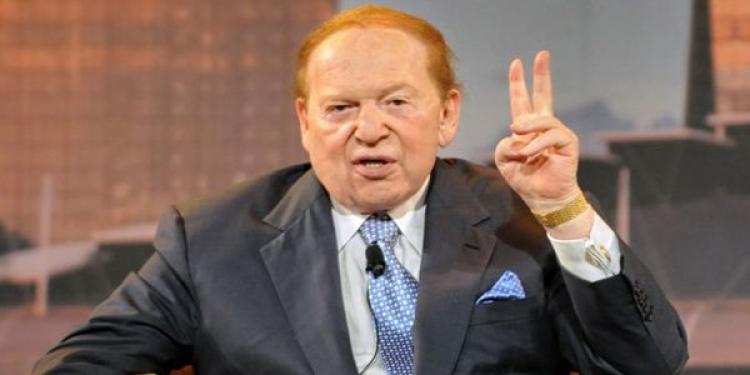Sheldon Adelson Betting on a VIP Gambling Rebound in Macau
Posted: October 3, 2014
Updated: June 4, 2017

Casino revenues in Macau have dipped sharply in August and September, but the city’s wealthiest casino operator is betting on a quick recovery.
The coastal enclave of Macau is a special administrative region in the People’s Republic of China. It’s almost completely self-governed and exempt from Chinese gambling laws, but its massive casino industry hangs on every word spoken by the authorities in Beijing.
Why? Because Macau depends on the mainland to provide most of its customer base, as wealthy Chinese businessmen and public officials wager billions of dollars each year in plush casinos like the Venetian Macau, Wynn Macau and City of Dreams.
That’s why an ongoing government crackdown on official corruption has thrown Macau casinos into a tailspin. The authorities in Beijing are devoting their energy to quashing money laundering by bribe-taking office holders, so they’re demanding that junket operators disclose information about their clientele.
To make a long story short, junkets are being extra careful, public officials are shying away from Macau and casino operators are feeling the squeeze in terms of smaller revenues. Year-on-year revenue fell by 12 percent during the month of September, making it the worst month for the city’s casinos since the market opened to foreign competition in 2003.
Hong Kong-based financial analyst Aaron Fischer predicts depressed growth for the remainder of 2014: “Macau growth has decelerated sharply and will remain weak for the next few months… October will run up against a tough base and there will be some teething problems around the new smoking ban.”
While Macau’s fortunes are looking down, its most powerful businessman is putting his money on a recovery.
Adelson sees business picking up, and soon
Las Vegas casino magnate Sheldon Adelson, archenemy of online casinos in America and owner of two of Macau’s biggest resort casinos, the Macau Sands and Macau Venetian, doesn’t appear to be very concerned, even has his company Sands China has seen its share price fall by one-third since July.
Prone to making emotionally-charged statements about online gambling in America and the Israel-Palestine conflict, Adelson acknowledged that Macau is experiencing a downturn but downplayed its significance: “Chinese players are staying below the radar. They don’t want to send the message they may be corrupt… Everything is cyclical… It’s like gambling. Sometimes you’re up, sometimes you’re down.”
Where is the silver lining for the 81-year old casino executive? Recent statements coming out of Beijing indicate that the government may be ready to ease back on the throttle with regards to the anti-corruption drive.
State news agency Xinhua reported that the Political Bureau of the Communist Party of China Central Committee determined that the goals of the crackdown had been met, and that the program may soon end. If so, this would mean that junkets would no longer be asked to provide information concerning their clients and public officials would be able to travel to Macau without facing suspicion.
While Adelson refers to this when reassuring investors of Macau’s rebound, analyst Cameron McKnight of Wells Fargo has preached caution, reminding investors that a renewed crackdown is also possible.
Adelson still disparaging online gambling in America
While boundlessly optimistic about the future of Macau, the Vegas-based billionaire is just as vigorous in his continued attempts to quash internet casinos and online gambling sites in America. 2013 saw state lawmakers in New Jersey, Delaware and his home state of Nevada pass some form of internet gambling against his urging, but he’s not giving up.
Speaking at the annual G2E Global Gaming Expo in Las Vegas, Adelson was hush about the situation in Macau but very vocal about his opposition to internet gambling at home. Some critics have claimed that online casinos pose competition to his operations in Vegas and Atlantic City, so his opposition stems from the desire to protect his wallet.
Adelson, with a net worth of nearly $40 billion, counters those claims with the argument that online gambling is much more difficult to regulated than the land-based variety, and that his desire is to protect American families from underage gambling and problem gambling, recalling that his father was a problem gambler.
His critics find those statements painfully ironic, arguing that a man who has made (and continues to make) billions of dollars offering gambling services has no right to turn around and claim an interest in protecting the public from problem gambling.
Whatever his motivation, the man has spent tens of millions of dollars lobbying legislators in Washington to pass an internet gambling ban that would make the use of online casinos, poker sites and sportsbetting sites illegal. Earlier this year two of his allies in Washington, Senator Lindsey Graham of South Carolina and Representative Jason Chaffetz of Utah introduced such a bill titled the Restoration of America’s Wire Act.
While the Restoration of America’s Wire Act continues to be debated on Capitol Hill, Adelson has busied himself with stumping for political and public support as well as tending to his business operations in the US and Asia. The coming months will see if his prediction of a rebound in Macau comes true, while the fate of his anti-online gambling bill will likely take longer to play out.
















